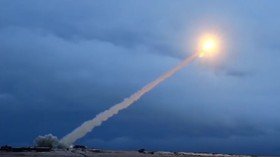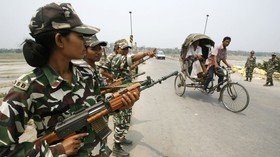US confirms pullout from INF treaty, Moscow will respond if missiles placed in Europe – deputy FM

Washington has confirmed its decision to withdraw from the INF treaty is final, Russia’s deputy foreign minister said, adding that Moscow will 'take measures' if American missiles that threaten its security are placed in Europe.
“Washington publicly announced its plans to withdraw from the treaty (the Intermediate-Range Nuclear Forces) already in October. Through the high-level bilateral channels it was confirmed to us that this decision was final and wasn’t an attempt to initiate dialogue,” Sergey Ryabkov told the Kommersant newspaper.
Also on rt.com Russia will easily design new missiles to defend itself if US pulls out of INF – PutinThe Deputy FM said that Moscow will respond to possible attempts to place short and intermediate range nuclear-capable missiles in Europe if the US decides to go on with this plan.
“We’ll be forced to come up with effective compensating measures. I’d like to warn against pushing the situation towards the eruption of new ‘missile crises.’ I am convinced that no sane country could be interested in something like this,” he said.
Russia isn’t threatening anybody, but have the necessary strength and means to counter any aggressor.
Back in October, President Donald Trump warned that Washington was planning unilateral withdrawal from the Intermediate-Range Nuclear Forces (INF) treaty because “Russia has not adhered to the agreement.” The US leader also promised that the country would keep boosting its nuclear arsenal until Russia and China “come to their senses.”
Also on rt.com US demands Russia ‘end or modify’ missile it doesn’t like to save INF treatyEarlier this month, US Secretary of State Mike Pompeo announced that Washington will suspend its obligations under the treaty within 60 days if Russia does not “return to compliance.”
Signed in late 1988, the INF agreement was considered a milestone in ending the arms race between the US and the USSR.
In recent years, Moscow and Washington have repeatedly accused each other of violating the INF deal. While the US has alleged that Russia has developed missiles prohibited by the treaty, Russia insists that the American anti-missile systems deployed in Eastern Europe can actually be used to launch intermediate-range cruise missiles.
The deputy FM said that Washington “never made a secret” of the fact that its INF treaty pullout “wasn’t so much about problems between the US and Russia, but about the desire of the Americans to get rid of all restrictions that were inconvenient for them.”
The US side expressed belief that the INF deal “significantly limits the US military’s capabilities to counter states with arsenals of medium-range and shorter-range ground-based missiles,” which threaten American interests, he said. “China, Iran and North Korea” were specifically mentioned by Washington, Ryabkov added.
“I don’t think that we’re talking about a new missile crisis, but the US plans are so far absolutely unclear,” Mikhail Khodarenok, retired colonel and military expert, told RT, reminding that the Americans have avoided any type of “meaningful discussion” with Moscow in regards to its INF deal pullout.
While “there’ll be no deployment of [US missiles] in Europe any time soon,” Moscow should expect that Washington would try to void other agreements with Russia as well, Khodarenok warned.
The INF deal “just stopped being beneficial for the US. Next up are all the other arms control treaties. There’ll be no resistance from the NATO allies [to US actions],” he said.
“The neocons who run Trump's foreign policy never have liked arms reduction treaties,” former Pentagon official Michael Maloof told RT. “The new START treaty which comes up for renewal also could be in jeopardy.”
Also on rt.com Trump’s neocons have always hated arms control agreements, INF is no different“The risk of a new nuclear buildup is really quite obvious” if the US withdrawals from the INF treaty, Dan Smith, the director of the Stockholm International Peace Research Institute, told RT.
“I think the relations between the great powers – the US and Russia as well as the US and China – are more difficult than they’ve been for a long time,” he added.
However, with Washington having indicated that it wants China to be part of the new deal, “there are still possibilities for negotiations and agreement,” according to Smith. Nonetheless, he warned that following this path will demand strong political will and tactical thinking from the leadership of all three countries.
Like this story? Share it with a friend!














